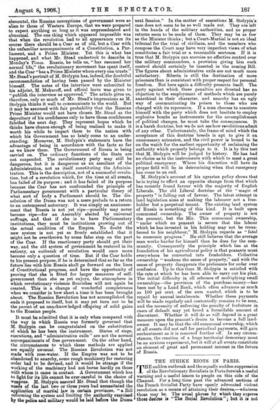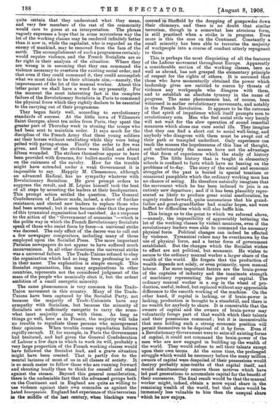THE STRIKE RIOTS IN PARIS.
T1TE sudden outbreak and the equally sudden suppression of the Revolutionary Socialists in Paris furnish a useful warning and a useful lesson to people on this side of the Channel. For a long time past the advanced sections of the French Socialist Party have openly advocated violent revolution as a 1)1041111 Of attaining their desires,—whatevel those may be. 1110 usual phrase by which they express those desires is "The Social Revolution"; but it is not quite certain that they understand what they mean, and very few members of the rest of the community would care to guess at an interpretation. The phrase vaguely expresses a hope that in some mysterious way the lot of the working classes may be rendered infinitely better than it now is, while the capitalist, who is regarded as the enemy of mankind, may be removed from the face of the earth. The accomplishment of such a programme certainly would require violence, and the French Socialists are so far right in their analysis of the situation. Where they are wrong is in assuming that they can command the violence necessary to overturn the existing social order, and that even if they could command it, they could accomplish what we must take to be their ultimate ahn,—namely, the improvement of the lot of the manual worker. About this Latter point we shall have a word to say presently. For the moment the most interesting fact is the complete failure of the Revolutionary Socialists in Paris to command the physical force which they rightly declare to be essential to the carrying out of their programme.
They began fairly well, according to revolutionary standards of success. At the little town of Villeneuve Saint Georges, about ten miles from Paris, they spent the greater part of Thursday week in stoning the troops who had been sent to maintain order. It says much for the discipline of the French Army that these young soldiers sat their horses without retaliating while they were being pelted with paving-stones. Finally the order to fire was given, and three of the strikers were killed and about fifteen wounded. The strikers themselves appear to have been provided with firearms, for bullet-marks were found on the cuirasses of the cavalry. How far the trouble might have extended under a weak Government it is impossible to say. Happily M. Clernencea,u, although an advanced Radical, has no sympathy whatever with Revolutionary Socialism. He gave prompt orders to suppress the revolt, and M. Lepine himself took the best of all steps by arresting the leaders at their headquarters.
This prompt action settled the question. The General Confederation of Labour made, indeed, a show of further resistance, and elected new leaders to replace those who had been arrested ; but it soon became clear that the power of this tyrannical organisation had vanished. As a response to the action of the "Government of assassins "—which is the polite way in which the French Revolutionary Socialists speak of those who resist force by force—a universal strike was decreed. The only effect of the decree was to call out a few newspaper compositors, including many of those employed upon the Socialist Press. The more important Parisian newspapers do not appear to have suffered much inconvenience. In all other directions the universal strike was a universal failure. The Trade-Unions refused to obey the organisation which had so long been professing to act in their name. The explanation is simple enough. This Socialist organisation, like many organisations in other countries, represents not the considered judgment of the mass of the people who nominally elect it, but the ardent ambition of a small energetic minority.
The same phenomenon is very common in the Trade- Union movement in this country. Many of the Trade- Unions have been captured by the Socialist Party, not because the majority of Trade-Unionists have any sympathy with Socialism, but because the minority of Socialists are sufficiently energetic to carry the some- what inert majority along with them. As long as things go well, here as in France, the majority will take no trouble to repudiate those persons who misrepresent their opinions. When trouble comes repudiation follows rapidly enough. If, for example, in Paris the Government had hesitated, and had given the General Confederation of Labour a few days in which to work its will, probably a very large proportion of the French working classes would have followed the Socialist lead, and a grave situation might have been created. That is partly due to the mental laziness of most of us in all classes of society. It is so much easier to follow those who are running forward and shouting loudly than to think for oneself and stand against the stream. Beyond this general consideration, there is the undeniable fact that the advanced groups both on the Continent and in England are quite as willing to use violence against their own comrades as against the hated bourgeoisie. England had experience of this terrorism in the middle of the last century, when blacklegs were coerced.in—Sheffield by the dropping of gunpowder down their chimneys, and there is no doubt that similar terrorism, though in a somewhat less atrocious form, is still practised when a strike is in progress. Even more is this the case on the Continent. Constantly a small minority has been able to terrorise the majority of workpeople into a course of conduct utterly repugnant to them.
This is perhaps the most disquieting of all the features of the Labour movement throughout Europe. Apparently a considerable section of the working classes, here as well as abroad, has not grasped the elementary principle of respect for the rights of others. It is assumed that those who have momentarily obtained the power which leadership gives are entitled to coerce by threats of violence any workpeople who disagree with them, and to establish an absolute tyranny in the name of progress. The same phenomenon has, of course, been witnessed in earlier revolutionary movements, and notably in the French Revolution. It appears to be the outcome of that spirit of impatience which itself prompts men to revolutionary acts. Men who feel social evils very keenly will not wait for the slow operation of sound remedial measures which alone can cure social ills. They imagine that they can find a short cut to social well-being, and anybody who disagrees with them must be swept out of their path or trampled underfoot. Only experience can teach the masses the hopelessness of this line of thought, and unfortunately the masses have not the advantage of that form of experience which the study of history gives. The little history that is taught in elementary schools is confined to facts which have no bearing on the problems of to-day. The story of the social and economic struggles of the past is buried in special treatises or occasional pamphlets which the ordinary working man has no chance of seeing. He therefore naturally imagines that the movement which he has been induced to join is an entirely new departure ; and if it has been plausibly repre- sented as likely to produce great social amelioration, he eagerly rushes forward, quite unconscious that his grand- father and great-grandfather had similar hopes, and were baffled by difficulties which will also baffle him.
This brings us to the point to which we referred above, —namely, the impossibility of appreciably bettering the lot of the working classes by violent measures, even if the revolutionary leaders were able to command the necessary physical force. Political changes can indeed be effected by violence. Tyrannical rulers may be overthrown by the use of physical force, and a better form of government established. But the changes which the Socialist wishes to effect are not political, but economic. He wishes to secure to the ordinary manual worker a larger share of the wealth of the world. He forgets that the production of wealth depends not solely, or even primarily, upon manual labour. Far more important factors are the brain-power of the captains of industry and the inanimate strength of machinery representing the power of capital. The ordinary manual worker is a cog in the wheel of pro- duction, useful, indeed, but replaced without any appreciable difference to the smooth working of the machine. On the other hand, if capital is lacking, or if brain-power is lacking, production is brought to a standstill, and there is no wealth for anybody to share. It is conceivable that the owners of capital and the owners of brain-power may voluntarily forego part of that wealth which their talents and their possessions command ; but it is inconceivable that men holding such a strong economic position will permit themselves to be deprived of it by force. Even if a Revolutionary Government were to seize all existing forms of capital, it could not command the brain-power of the men who are now engaged in building up the wealth of the world. They would refuse to sell their talents except upon their own terms. At the same time, the prolonged struggle which would be necessary before the many million owners of capital were despoiled of their possessions would destroy probably nine-tenths of that capital itself, and would simultaneously remove those motives which have led past generations to accumulate capital for the benefit of their successors. The final result would be that the manual worker might, indeed, obtain a more equal share in the remaining wealth of the world, but that share would be immensely less valuable to him than the unequal share which he now enjoys.



































 Previous page
Previous page